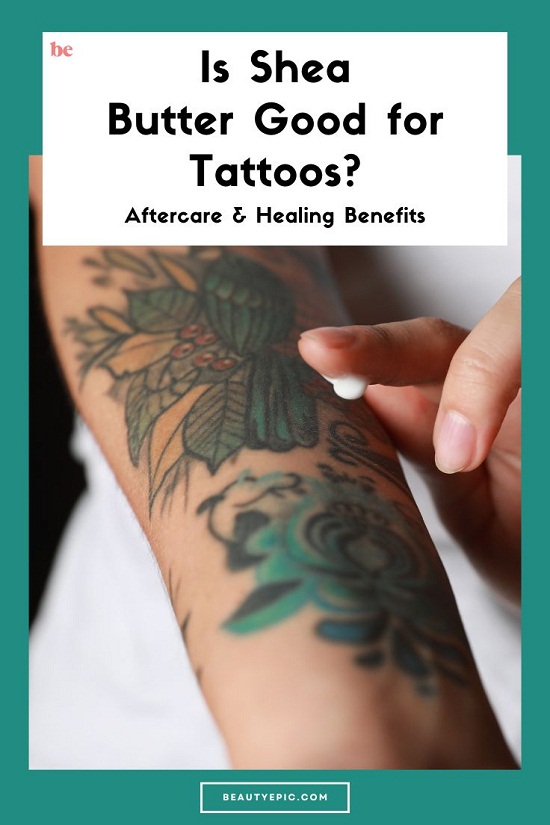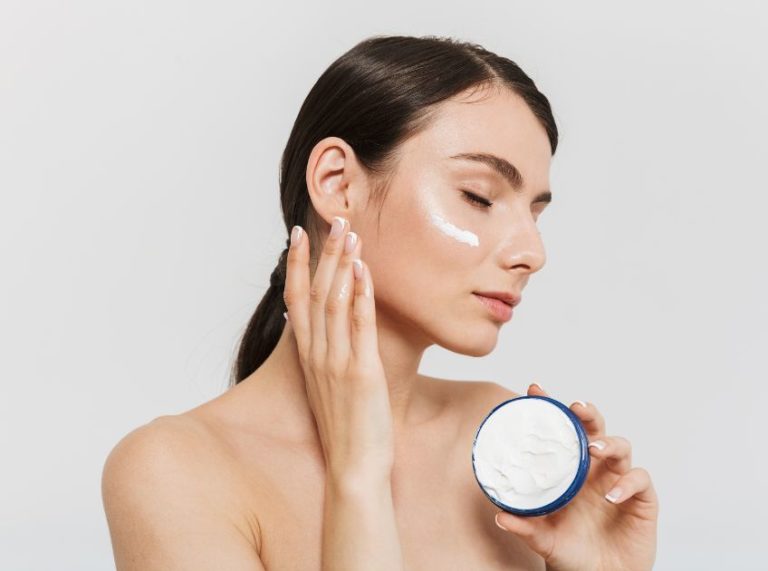
Important: This article is for informational purposes only. Please read our full disclaimer for more details.
Slathering some shea butter on that fresh ink? Brilliant choice! This creamy wonder isn’t just for massages and moisturizing. It seriously helps during tattoo healing, letting our artwork pop just as bright and bold as day one.
Healing Benefits of Shea Butter
We’re not just blowing smoke here—shea butter does wonders when it comes to nursing our skin back to life after a tattoo. Its friendly fats grab onto moisture like nobody’s business, handing your tattoo a hydration hug that sticks around. This makes it a real champ for aftercare (1). Those silky ingredients? They turn flaky, parched skin into silky-smooth goodness, setting the stage for our new tats to heal practically perfectly.
But hold up, there’s more. Shea butter’s got the stuff to calm down the red and itchy—those dreaded woes post-tattoo wrap removal. Mother Nature gave it anti-inflammatory perks (2). So, yeah, it’s kind of a big deal.
| Healing Perk | Why It Rocks |
|---|---|
| Moisture Hug | Hydrates the skin, fights dryness |
| Calming Effect | Cuts down on redness and itchiness |
| Soothing Stuff | Makes healing more bearable |
Skin Care Vitamins in Shea Butter
Talk about packing a punch! Shea butter’s loaded with vitamins our skin will thank us for. Ever heard of vitamin E and vitamin A? These skin saviors work their magic to fix and fancy up our skin’s vibe. Vitamin E acts like a cool healer, and vitamin A helps keep our skin looking its Saturday best.
Put these two together, and they start tag-teaming skin cell growth, with added anti-aging power. Whether it’s fresh ink or just routine skin lovin’, shea butter’s got us covered.
| Vitamin | Superpower |
|---|---|
| Vitamin E | Cares and repairs the skin |
| Vitamin A | Promotes that healthy glow and feel |
By making shea butter part of our tattoo ritual, we’re doing our skin a solid—boosting healing while making sure our tattoos stay as striking as our personalities.
Ingredients Making Shea Butter Even Better for Tattoos
Let’s dive into the goodness of shea butter and see how it’s a game-changer for tattoo aftercare when mixed with a few other skin-loving goodies. Mixing it up with some pals can make it even more awesome for your ink.
Mixing Shea Butter with Cool Companions
Throwing shea butter together with other ingredients gives it some extra oomph for your skin. Check out these power partners that play well with shea:
| Ingredient | Perks |
|---|---|
| Aloe Vera | Calms that redness and helps keep your skin hydrated and happy. |
| CBD Oil | Works like a charm on calming the redness and taking down the inflammation. |
| Rosemary Oil | Packs an antioxidant punch, keeping your skin healthy and defended. |
| Grapefruit (AHA) | Helps get rid of those dead skin cells, keeping unwanted peeling at bay. |
These buddies help tackle the common culprits like redness, swelling, and itching that pop up when you’re healing. Keeping your skin moisturized and protected is a must for getting your tattoo to heal right.
The Power Trio: CBD, Aloe, and Rosemary Oil
Mixing in some CBD, aloe, and rosemary oil into your tattoo care routine can bring some serious softening and brightening action to the table:
- CBD Oil: This stuff is famous for bringing down the redness and calms things down, making your tattoo healing a breeze.
- Aloe Vera: Known for its soothing powers, aloe cools the skin and keeps it moist, helping with the itching and ouchies.
- Rosemary Oil: With its mega antioxidant punch, rosemary oil helps defend your skin’s cells against all those nasty outside stuff that can cause trouble.
Elevating your shea butter game by infusing it with these oils turns it into a real powerhouse for tattoo care. Imagine whipping up a balm that hydrates, soothes, and speeds up recovery in one go (3).
Choosing the right mix really cranks up the power of shea butter and helps your tattoo heal like a dream.
Effective Use of Shea Butter for Tattoos
Proper Aftercare for Tattoos
We all know tattoos are more than just a piece of art on our bodies; they’re stories, memories, and expressions. But skip proper aftercare, and your precious tattoo can turn into a blotchy mess. Keeping our new ink happy and healthy is job number one. Enter shea butter—the real MVP of tattoo aftercare. This buttery goodness locks in moisture, feeding our skin with vitamins E and A, while antioxidants and allantoin rally together to boost skin health (3).
To keep things clear and simple, here’s a quick rundown of what we need to remember:
| Step | Action |
|---|---|
| 1 | Give our tattoo a gentle bath with mild soap and water. |
| 2 | Dab it dry—no rubbing! Using a clean towel. |
| 3 | Slather on a thin layer of shea butter to fight dryness. |
| 4 | Repeat the shea love 2-3 times a day. |
| 5 | Stay away from too much sunshine and lengthy water play. |
Before changing up our routine, it’s smart to have a chat with our tattoo artist—they know the drill when it comes to our unique skin quirks (1).
Enhancing Skin Healing with Shea Butter
Taking our skin healing game a notch higher is easy with shea butter and some of its superstar friends. Mix it up with CBD, aloe, and rosemary oil, and voila—we have a healing concoction that can soothe, calm, and renew our skin better than ever (3).
Here’s a look at how each ingredient partners with shea butter:
| Ingredient | Benefits |
|---|---|
| Shea Butter | Packs serious moisture, vitamins E & A, helping skin bounce back. |
| CBD | Calms the skin, kicking out irritation and keeping inflammation in check. |
| Aloe | Packs hydration and serenity for irritated skin, aiding repair. |
| Rosemary Oil | Gets the blood flowing and dials down the redness. |
By harnessing this powerhouse of ingredients, we’re ensuring our tattoos heal smoothly while looking downright stunning.
Shea Butter in Tattoo Aftercare Products
Shea butter is stealing the spotlight in tattoo aftercare for its awesome moisturizing and healing power. Let’s take a closer look at how this creamy gold is making waves in tattoo treatments and beauty products.
Shea Butter in Tattoo-Specific Formulas
Tattoo products often add shea butter because it’s such a great moisturizer. This natural gem comes from the nuts of the African shea tree and has been used for ages to soothe and heal. It’s like a balm for fresh ink, speeding up healing.
Adding shea butter to your tattoo care routine keeps the skin supple and locked with moisture—perfect for helping tattoos heal nicely. Blend it with other soothing ingredients, and you have a powerful mix to boost skin recovery.
| Tattoo Aftercare Product Type | Shea Butter Content (%) | Benefits |
|---|---|---|
| Tattoo Creams | 15-30% | Hydrates deeply, calms irritation |
| Ointments | 20-40% | Protects skin, keeps it moist |
| Lotions | 5-15% | Lightweight, perfect for everyday use |
Incorporating Shea Butter into Beauty Cosmetics
Shea butter is a big deal in beauty products due to its ability to intensely moisturize and mix well with other skin-loving ingredients. Many lotions and creams use shea butter to keep your skin healthy and hydrated, making it a staple, especially for those with tattoos.
In body butter, shea butter unleashes its full potential, keeping your skin looking firm and smooth, and even helping with collagen and skin repair (2). Its gentle nature means it’s perfect for everyone, no matter how sensitive your skin might be.
| Cosmetic Type | Shea Butter Benefits |
|---|---|
| Body Butters | Super hydrates dry patches |
| Creams and Lotions | Keeps skin soft and moisturized |
| Tattoo Salves | Calms and nurtures healing skin |
To wrap it up, shea butter is a champion in both tattoo aftercare and beauty products, providing a big boost to skin health and healing. It’s a versatile ingredient that helps keep skin happy, especially when new tattoos are involved.
















